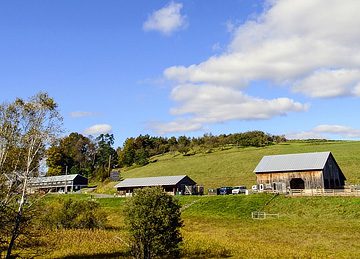The Mountain School in Vershire, Vermont has been living in a time warp. It lies far enough out in the woods so as to be relatively cut off from digital technology. Cell phones get a weak signal at best. If you want the Internet, you have to settle for dial up.

Such literal distance from technology creates an experiential distance that fits the Mountain School perfectly, according to Vivian Yee, writing from the New York Times. In her recent article, “A School Distanced from Technology Faces Its Intrusion,” Yee describes the Mountain School experience this way:
The school offers high school juniors, many from elite private institutions in the Northeast, a semester to immerse themselves in nature. The students make solo camping trips to a nearby mountain for a day or two of reflection, and practice orienteering skills without a GPS device. Between English and environmental science classes, they care for farm animals, chop wood and read the works of Robert Frost. And in the process, many say, they stop scouring the campus for its sparse bars of reception and lose the habit of checking their Facebook pages at every opportunity.
But things are about to change for the Mountain School. High-speed Internet is coming to Vershire, with improved cell phone service not far behind. For many country dwellers, this would be great news. For those at the Mountain School, not so great at all. As Yee comments, pending technological improvement “presents a challenge for the Mountain School: how to regulate the use of smartphones and other devices that serve as a constant distraction for 21st-century teenagers, who are here to engage with the rural setting and with one another.”
There could be a simple solution, of course: ban the use of cell phones and other means of going online. This would preserve the Mountain School as an offline oasis. But, the school is committed to letting students and other members of its community make right choices rather than be governed by rules. So, though many have asked the school’s director, Alden Smith, to ban smartphones and the like, he has declined. “We have to figure out the balance between how to preserve the values we have,” Mr. Smith said. “But I tend to think that adolescents, particularly the ones we get here, when mentored, will rise to the occasion when trusted with real responsibility.” In fact, students are drafting a policy that includes initial surrender of smartphones for new students. After a while, students can choose to keep their phones or not.
If you live in a consistently connected reality, you might wonder why all of this is such a big deal. A paragraph from Yee’s article begins to explain why.
At first, Andy Sharp, 17, from nearby Thetford Academy, missed participating in his friends’ fantasy football league online. But after most of a semester at the school, he said, he uses his laptop only for doing homework and checking Facebook occasionally. “I didn’t think that was going to happen to me, but it did,” he said. “Your focus shifts to things that are in front of you.”
Your focus shifts to things that are in front of you . . . like people and trees and books and tools and skies, those sorts of things.
I was struck by how Yee concludes “A School Distanced from Technology Faces Its Intrusion.”
Mr. Smith and other longtime teachers say their goal is not to encourage their students to live without technology, but to make them think more carefully about their use of it.
“The idea is not to be going back to a time where things were better,” Mr. Smith said, “but where the richness of each day is defined by the food you eat, the company you keep, the work you do.”
Yes! Exactly! As one who uses digital technology all the time, like right now, for instance, I am eager to think carefully about how I use it. I want to live in a way where the richness of each day is defined by the food I eat, the company I keep, and the work I do. Yes, some of my company will be digitally mediated. And, yes, some of my work will use digital tools. But I don’t want to lose the benefits that come from focusing on the things and the people that are right in front of me.
Most of us and most institutions have not done what the Mountain School is doing. We have not come together in our communities to consider how we want to interact in and with the digital world. We have not made conscious choices about how, when, and why to be digitally engaged. Rather, we have jumped into the stream of bits and bytes without a second thought. Perhaps that’s one reason why so many of us feel as if we’re drowning.











